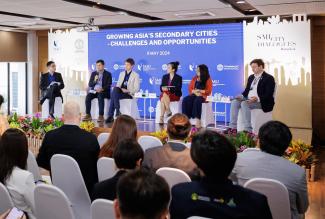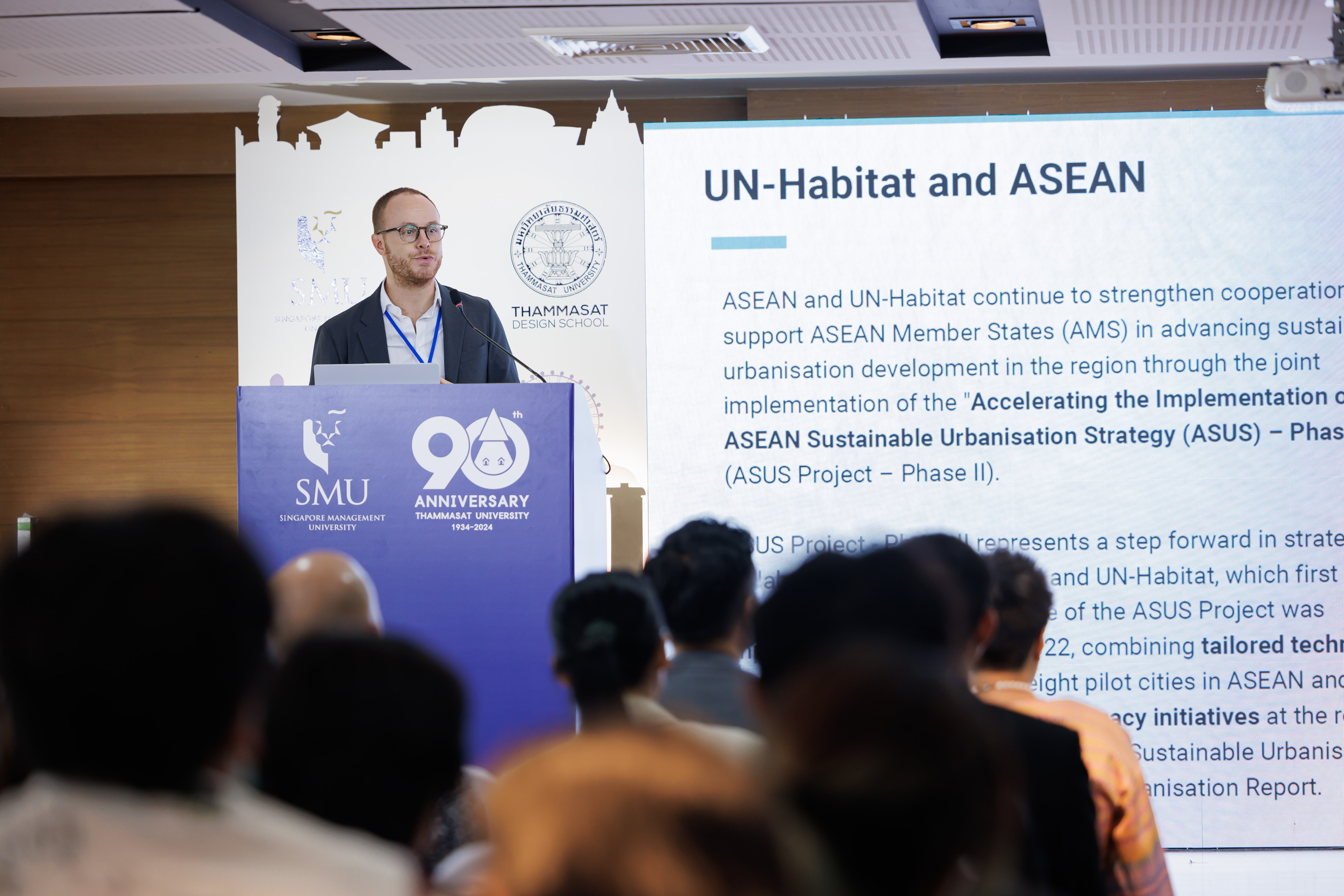
In line with SMU’s mission to foster knowledge-sharing and regional collaboration as a gateway university in Asia, the inaugural overseas edition of SMU City Dialogues was launched in Bangkok on 9 May 2024. Organised in partnership with the Thammasat Design School of Thammasat University, the event centred around the theme "Growing Asia’s Secondary Cities – Challenges & Opportunities."
The SMU City Dialogues series was conceived as a platform to gather leaders from industry, government, and academia for candid and uninhibited discussions to ideate innovative solutions for tackling today’s global challenges, with the aim of influencing policy and industry.
Keynote speaker, Mr Riccardo Maroso, Programme Manager, United Nations Human Settlement Programme (UN-Habitat), Bangkok Programme Office, Regional Office for Asia and the Pacific (ROAP) shared key insights from the ASEAN Sustainable Urbanisation Strategy (ASUS), highlighting that by 2030, there would be 70 million additional urban dwellers in ASEAN cities, with 56% of its entire population urbanised. The main demographic and economic growth across ASEAN is happening in smaller ‘middleweight’ urban areas, providing the opportunity for balanced urban and spatial development and regional integration.
Nonetheless, secondary cities encounter numerous obstacles and will need strategic support and investments to effectively strategise and oversee sustainable growth, while ensuring the provision of high-quality services and livelihood opportunities for all residents. Mr. Maroso asserts that the focus of prominent international entities like ASEAN and the UN, the escalating academic research and discussions, and the heightened initiatives from ASEAN nations are promising advancements towards an integrated strategy for policy formulation and implementation, fostering sustainable urban development that inclusively benefits every individual regardless of location.
The panel session was moderated by Dr Adrian Lo, Director, Urban Design & Development International Programme, Faculty of Architecture & Planning, Thammasat University (Thailand), and include the following regional panel experts:
- Dr Adiwan F. Aritenang, Director, Postgraduate Programme, Urban & Regional Planning Programme, Institut Teknologi Bandung (Indonesia)
- Mr Clinton Moore, United Nations Economic and Social Commission for Asia and the Pacific (UNESCAP) (Thailand)
- Associate Professor Orlando Woods, Director, SMU Urban Institute (Singapore),
- Dr Rattikarn Khambud, Department of Public Works & Town & Country Planning, Ministry of Interior (Thailand), and
- Dr Tu Anh Trinh, Director, Institute of Smart City & Management, University of Economics Ho Chi Minh City (Vietnam).
The panel concurred that there is no standard way of classifying cities into primary or secondary categories, as cities differ from each other in every country in scale and scope. They agreed that secondary cities tend to receive less support, and so may lack the capacity and knowledge to develop their potential fully in order to progress.
SMU Assoc Prof Woods also shared that all cities are increasingly becoming valuable to the private sector because of the data they produce. Secondary cities can also be valuable to the right kinds of investors.
Asst Prof Asan Suwanarit, Dean of Thammasat University’s Faculty of Architecture & Planning said, “We cannot look at these secondary cities in isolation. We need to look at them as a network with other cities and the relationship of the non-physical aspects as well, such as economic, social, and cultural, that can cause environmental issues. That will give a more comprehensive understanding of the relationship between cities, of how each city can complement and impact each other.”
Following the panel session, Assoc Prof Woods and Asst Prof Aidan Wong from the SMU College of Integrative Studies moderated one of two parallel dialogue sessions, where a curated group of specialists in the field came together for a more in-depth discourse around the event theme. The insights gathered will contribute to a comprehensive analysis and commentary, summarising salient points and concepts generated from the discussions.


